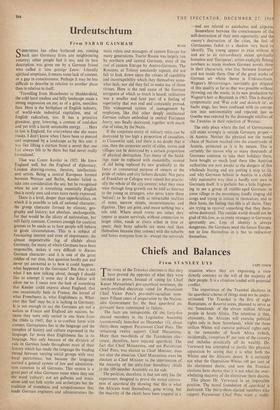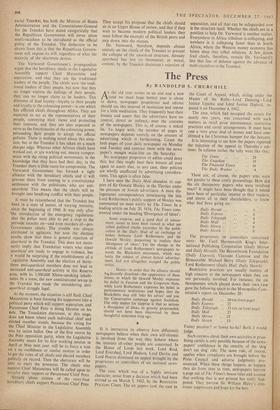Chiefs and Balances
From STANLEY UYS
CAPE TOWN
FT' tn. irony of the Transkei elections is that they
have proved the opposite of what they were intended to prove. Instead of voting for Chief Kaiser Matanzimals pro-apartheid nominees t the newly-enrolled electorate voted for Paramount Chief Victor Poto's pro-multi-racialism nom- inees. Fifteen years of preparation by the Nation- alist Government for the final apartheid ex- periment have culminated in failure.
The facts are indisputable. Of the forty-five elected members in the Legislative Assembly (ceremonially launched on December II), about thirty-three support Paramount Chief Poto. The remaining twelve support Chief Matanzima. More than two-thirds of the Transkeian elec- torate, therefore, have rejected apartheid.• The fact that Chief Matanzima, and not Paramount Chief Poto, was elected as Chief Minister, does not alter the situation. Chief Matanzima owes his election as Chief Minister to the intervention of the majority of the sixty-four hereditary chiefs in the 109-member Assembly on his side.
The position, therefore, is that..not only has the experiment, designed to prove the moral correct- ness of apartheid (by showing that this is what the Africans want themselves), gone wrong, but the majority of the chiefs have been trapped in a situation where they are expressing a view directly contrary to the will of the majority of their people. It is a situation loaded with potential conflict.
The importance of the Transkei elections in the apartheid scheme of things must not be under- estimated. The Transkei is the first of eight Bantustans, or Reserve areas, planned to Serve as the 'homelands' of the eleven million African people in South Africa. The intention is that, ultimately, the Africans will exercise political rights only in these 'honlelands,' while the three million Whites will exercise political rights only in the remainder of South Africa (which, incidentally, comprises 87 per cent of the country and includes- practically all its wealth). Dr. Verwoerd has attempted to justify this physical separation by saying that it is what both the Whites and the Africans desire. It is certainly not what the Opposition Whites (48 per cent of the electorate) desire, and now the Transkei elections have shown that it is not what the over- whelming majority of the electorate there desires.
This places Dr. Verwoerd in an impossible position. The moral foundation of apartheid is destroyed. The thirty-three elected members ■s,ho support Paramount Chief Poto want a multi-
racial Transkei, but both the Minister of Bantu Administration and the Commissioner-General for the Transkei have stated categorically that the Republican Government will never allow multi-racialism to be introduced as the official policy of the Transkei. The deduction to be drawn from this is that the Republican Govern- ment will impose its will, regardless of what the majority of the electorate desires.
The Verwoerd Government's propagandists argue that the hereditary chiefs in the Legislative Assembly support Chief Matanzima and separatism, and -that they are the traditional leaders of the people. The chiefs were the tradi- tional leaders of their people, but now that they no longer express thc feelings of their people, they can no longer claim to be leaders. This dilemma of dual loyalty—loyalty to their people and loyalty to'the colonising power—is one which has afflicted chiefs throughout Africa. They are 'expected to act as the representatives of their people, conveying their views and protecting their interests, and they are also expected to serve as the functionaries of the colonising power, persuading their people to accept the official policies. There is nothing novel about this situa- tion, but in the Transkei it has taken on a much sharper edge. Whereas other African chiefs have worked out, or are working out, uneasy compro- mises with the rising political movements, in the knowledge that they have had their day, in the Transkei there is little room for compromi§e. The Verwoerd Government has formed a tight alliance with the hereditary chiefs and it will prevent them from coming to a constitutional settlement with the politicians, who are anti- apartheid. This means that the chiefs will be brought into headlong conflict with their people.
It must be remembered that the Transkei has been in a state of unrest, of varying intensity, since the beginning of 1960. It was only after 'the introduction of the emergency regulations that the police were able to put a stop to the periodic assaults on—and even murders of—pro- Government chiefs. The trouble was always attributed to agitators, but now the election results show that there is general rejection of apartheid in the Transkei. This does not neces- sarily imply that Transkeian voters who reject apartheid are ready to engage in violence, but it would be surprising lithe establishment of a '...egislative Assembly and the election of thirty- three anti-apartheid members does not lead to increased anti-apartheid activity in this Reserve area, with its 1,500,000 Xhosa-speaking inhabi- tants. In a sense, the new constitutional set-up in the Transkei has made the smouldering anti- apartheid struggle legal.
At the moment, the situation is still fluid. Chief Matanzima is busy forming his supporters into a political party which will support separatism, and Paramount Chief Poto is doing likewise on his side. The Transkeian electorate, at this stage, does not know where each individual chief and elected member stands, because the voting for the Chief Minister in the Legislative Assembly was by secret ballot. One of the first moves by the Poto opposition party, when the Legislative Assembly meets for its first working session in April or May next year, will be to force a vote on a no confidence or similar motion in order to get the votes of all chiefs and elected Members publicly on record. Then the electorate will be able to exert the pressures. 'The chiefs who support Chief Matanzima will 6e called upon to transfer their support to Paramount 'Chief Poto. Already about sixteen of the sixty-four hereditary chiefs support Paramount Chief Poto.
They accept his proposal that the chiefs should sit in an Upper House of review, and that if they wish to become modern political leaders they must follow the example of the British peers and step down into the masses.
Dr. Verwoerd, therefore, depends almost entirely on the chiefs of the Transkei to prevent the collapse of the apartheid structure. Already apartheid has lost its theoretical, or moral, content, by the Transkei electorate's rejection of separatism, and all that can be safeguarded now is the structure itself. Whether the chiefs are in a position to help Dr. Verwoerd is another matter. Everywhere in Africa tribalism is collapsing, and nowhere is it collapsing faster than in South Africa, where the-Western money economy has bitten deep into tribal relations. A few‘ dozen frail chiefs, therefore, remain Dr. Verwoerd's last thin line of defence against the advance of multi-racialism in the Transkei.































 Previous page
Previous page